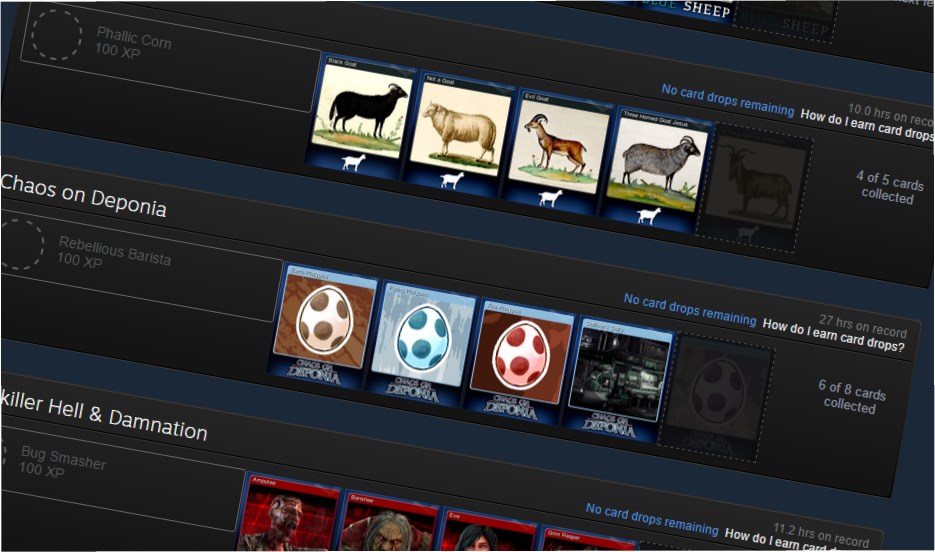Steam trading cards are getting an update to prevent abuse with 'fake games'
Valve says "bad actors" gaming the trading card economy are screwing up the Steam store algorithm.

Steam trading cards may not immediately strike you as an aspect of the platform that's in dire need of an overhaul. According to this new Steam blog post, however, you (and I) would be wrong in that assumption. It turns out that the system is open to gaming by "bad actors" who have figured out ways to manipulate Steam Greenlight to enable "card farming." And that's a bigger problem than you might think.
The whole thing traces back to the popularity of Steam cards, which quickly grew beyond Valve's initial goals for them—"small collectibles" for fans of particular games, "an easy way to add extra value" for developers—to the point "where the demand for cards became significant enough that there was an economic opportunity worth taking advantage of."
"That's when our group of bad actors arrived, aiming to make money by releasing 'fake' games on Steam," the blog post explains. "These fake developers take advantage of a feature we provide to all developers on Steam, which is the ability to generate Steam keys for their games. They generate many thousands of these keys and hand them out to bots running Steam accounts, which then idle away in their games to collect Trading Cards. Even if no real players ever see or buy one of these fake games, their developers make money by farming cards."
Valve acknowledged that nobody is really being hurt by the trade in "fake" Steam cards. The problem is that the games used to generate the cards messes up the Steam Store algorithm, which as Valve explained last week is the core component in making the Steam store work. "These Trading Card farming games produce a lot of faux data, because there's a lot of apparent player activity around them," Valve wrote. "As a result, the algorithm runs the risk of thinking that one of these games is actually a popular game that real players should see."
The simple plan would be to remove the financial component from Steam cards, but Valve is taking less drastic approach. Instead, Valve is going to introduce a "confidence metric" to the system that will keep games from dropping cards until it is established that the game in question is actually being purchased and played by real people. Once that happens, cards will drop to players as normal.
Based on the comments, not everyone is thrilled with the new plan. At least one user posited a scenario in which collectors end up missing out on Steam trading cards because small, but legitimate, games with cards fail to meet the metric established by Valve. But Valve said that only a limited number of games will actually be impacted by the change, and expressed confidence that the overall benefits will be worth any bumps in the road that may be encountered.
"With this change, we hope to significantly reduce the economic incentive for the bad actors to release fake games on Steam. We're hopeful that this will have little negative impact on other developers and players, with a small number of games having a delay before their Trading Cards start to drop," Valve wrote. "On the positive side, it should significantly improve the quality of the data being fed into the Store algorithms, which is a good thing for everyone."
The biggest gaming news, reviews and hardware deals
Keep up to date with the most important stories and the best deals, as picked by the PC Gamer team.

Andy has been gaming on PCs from the very beginning, starting as a youngster with text adventures and primitive action games on a cassette-based TRS80. From there he graduated to the glory days of Sierra Online adventures and Microprose sims, ran a local BBS, learned how to build PCs, and developed a longstanding love of RPGs, immersive sims, and shooters. He began writing videogame news in 2007 for The Escapist and somehow managed to avoid getting fired until 2014, when he joined the storied ranks of PC Gamer. He covers all aspects of the industry, from new game announcements and patch notes to legal disputes, Twitch beefs, esports, and Henry Cavill. Lots of Henry Cavill.

